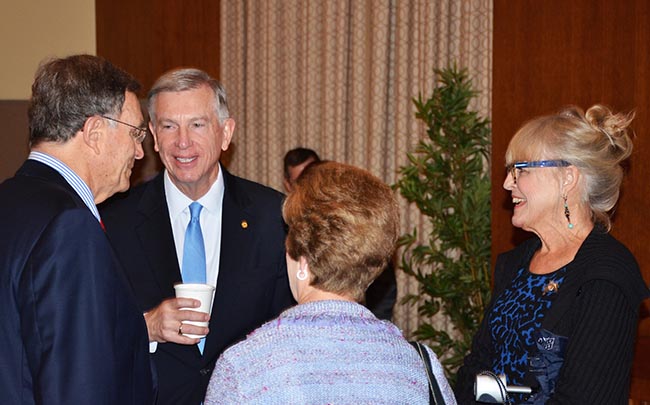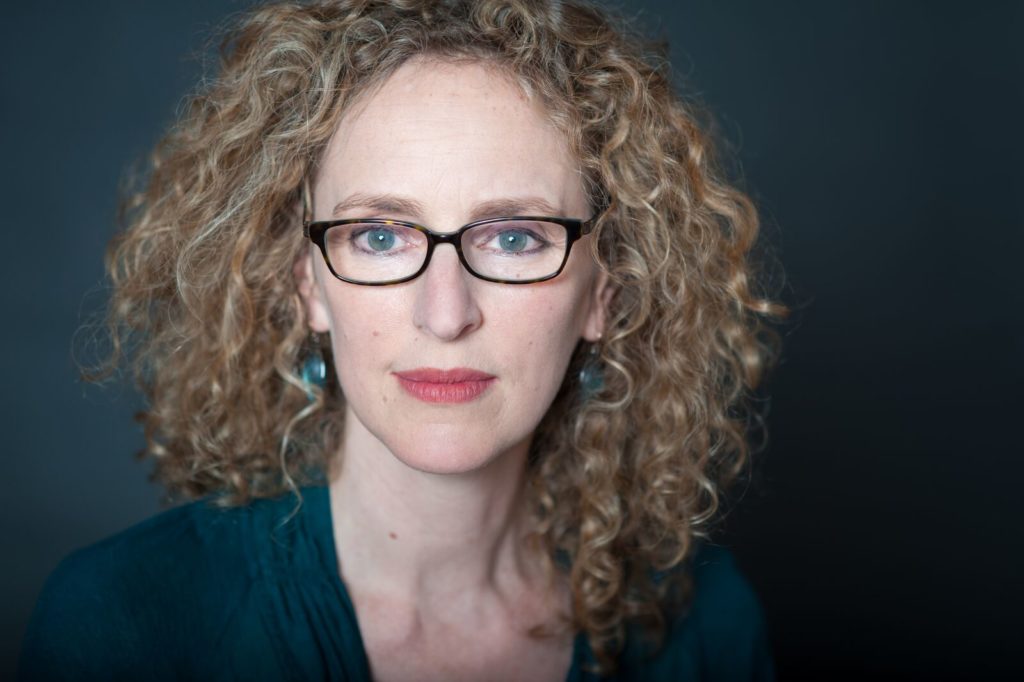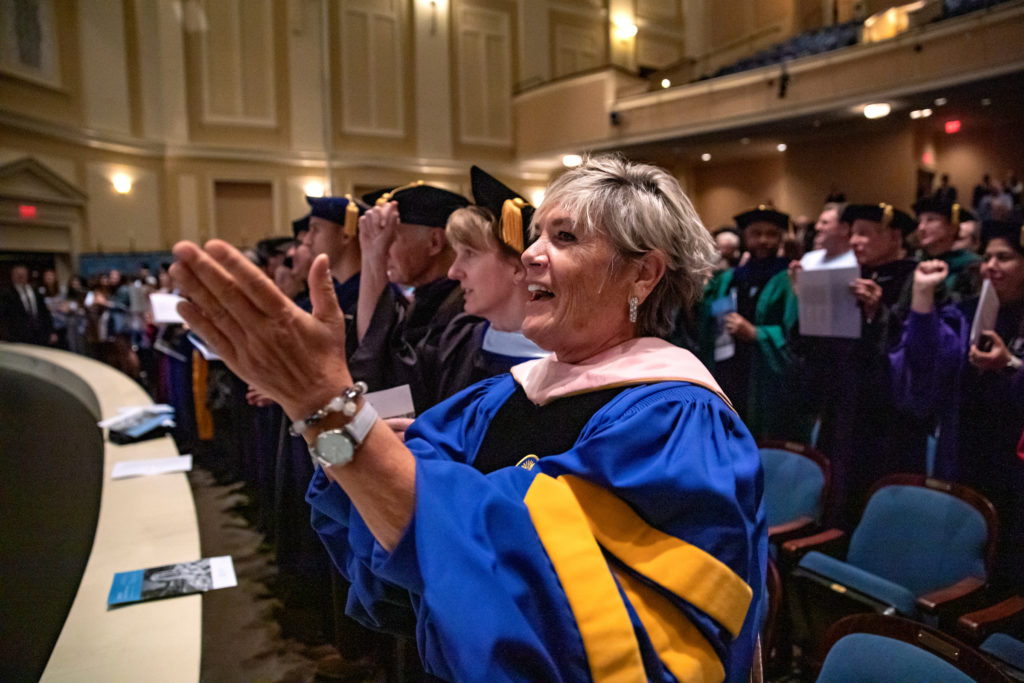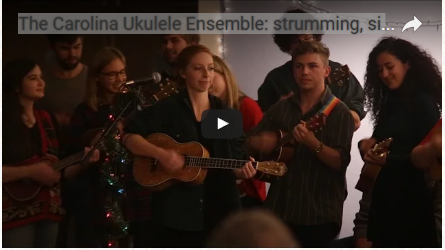
Can society still afford the luxury of the liberal arts?
That was the timely question that Carolina’s Program in the Humanities in the College of Arts and Sciences posed to a six-member panel on Oct 10. In the week leading up to the discussion, Carolina had celebrated a faculty member winning a Nobel Prize in Chemistry, followed two days later by an innovation summit on Polk Place.
“We at the program celebrate and affirm this kind of entrepreneurial and scientific work, but we also want to affirm the achievements of our great writers, artists and musicians,” said history professor Lloyd Kramer, the faculty director of the Program in the Humanities that sponsored the event.
While there is wide public agreement that students need to know about computer technology and the STEM subjects (science, technology, engineering and math), there are increasing doubts about the value of the liberal arts in the changing economic environment.
“Many teachers and scholars now believe that they must constantly justify or defend the liberal arts in general and the humanities and the creative arts in particular,” Kramer said.
Marianne Gingher said she started writing stories when she was 6 years old and never stopped.
Gingher went on to become a fiction writer and English and creative writing professor at Carolina. In 1995, she invited author Annie Dillard to visit her class and speak of the writing life.
I have always thought that to be a complete person you have to mix the scientific side with the human side. When I came from Jamaica to teach in the United States, I was disappointed in the way that the humanities have been treated.
Michele Owen, a social sciences teacher at Eaton-Johnson Middle School in Vance County Schools.
As a preface, Dillard warned her students that their chance of getting a work of fiction published was one in 3,000. She then told them to tuck that information into the corner of their minds and write whatever it was they were going to write, Gingher said.
Gingher said she gives her students that same kind of advice today.
Most of her students will not go on to pursue writing careers, Gingher knows, “but they will all leave my classes as more thoughtful and capable readers and communicators. And without skills in comprehension and communication, we’d all be whistling in the dark.”
Michael Tiemann, vice president of open source affairs at Red Hat Inc., quoted Athenian historian Thucydides to explain why society cannot afford to abandon the liberal arts. Thucydides wrote: “The state that separates its scholars from its warriors will have its thinking done by cowards and its wars fought by fools.”
Tiemann said that Derek Bok, the former president of Harvard University, captured the same insight with these words: “If you think education is expensive, try ignorance.”
UNC President Tom Ross said the modern critique of higher education goes something like this: The costs of college keep going up and up. Student debt keeps going up and up.
Those two sets of facts are indisputably true, Ross said. Where some critics go wrong is the remedy they propose, which is to use universities to train students for the jobs available to them when they graduate.
That, Ross said, is a bad idea. “The liberal arts are not designed to be a pathway to a particular job,” Ross said. “They are a pathway to a career, and I think that is important to remember.”
Most business leaders will tell you they need people who can think critically and write well, Ross said, people who can engage in analytical reasoning, think across disciplines and work collaboratively in teams of people from diverse backgrounds and cultures.
The importance of the liberal arts hit home for Ross when he and a contingent from the Board of Governors traveled to China to visit with education leaders. Part of China’s five-year plan, they said, is to “make their population creative.”
Naturally, Ross said, they asked how what we teach in America makes people creative.
“Of course I knew the secret, but I wasn’t going to tell them,” Ross said.
Ross said greater emphasis on training usually happens when economic times are tough and jobs become hard to find – times like what the country has come through since the Great Recession that began in 2008.
Chancellor Carol L. Folt said the questioning is further complicated by the exponential explosion of knowledge driven by the digital age. Then again, she said, change in America is nothing new.
She grew up in Akron, Ohio, in the era of Sputnik – an age of optimism when people of her generation were raised to believe anything was possible.
She said she remembered how her father took her to see a super computer – “the size of this room” – at B.F. Goodrich and told her, “This is the future.” The future also opened new opportunities for women that Folt, Carolina’s first woman chancellor, seized as both a research scientist and administrator.
Change creates endless new possibilities, but it also stirs uncertainties that Folt called “the churn.”
“I think we need to remember that is what it feels like for students today,” Folt said. “They live in the churn. They are excited by the churn.”
Instead of running from the churn, Folt said, educators must learn to embrace it.
“Churn is agency. If we believe that we are in charge of it, we are in charge of it.”
The event included an hour-long Q&A session with members of the audience, who included students, faculty, administrators and public school teachers from around the state, as well as salon-style lunch discussions in which the question about the liberal arts’ value was further discussed.
Kramer said he hopes the discussions serve as a starting point for ongoing debate – “not a declaration of permanent truth.”
“We are going to launch a conversation that will continue today, that will continue next week, that will continue all year,” Kramer told the audience before the discussions began. “In fact, if the past 2,500 years are any example, I would predict this conversation will continue for the next two millennia.”




